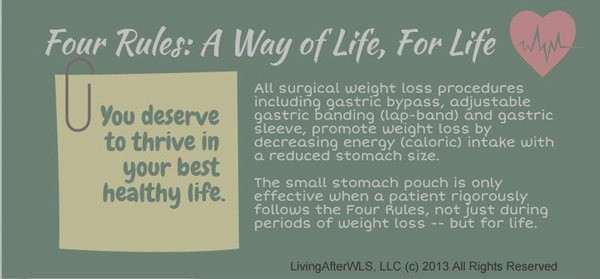 |
| Get this free Four Rules magnet with any LAWLS Bookstore order No coupon required Part of your complimentary goody bag. SHOP NOW |
So, with your indulgence I'm using the LivingAfterWLS Blog and our different newsletters to study and refresh my understanding of the Four Rules of weight loss surgery. You've already seen some posts related to the Four Rules and I'll continue to work through each rule in detail as the month marches along. Today I'm sharing the Four Rules Summary, with permission, from The 5 Day Pouch Test Owner's Manual
Thanks for joining me this year and I'm looking forward to feeling my best as I set to right my health in this new year!
Four Rules: Weight Loss Surgery basics
Shared with permission from The 5 Day Pouch Test Owner's Manual (2nd Edition) by Kaye Bailey"As patients we are well aware that WLS is frequently perceived by outsiders as an easy means to weight loss that requires little or no effort by the patient. It turns out there is nothing easy about the post-WLS lifestyle. At the time of surgery we agreed to follow Four Rules of dietary and lifestyle management guidelines for the rest of our life in order to lose weight and maintain a healthy weight. This is our burden and our responsibility if we wish to keep morbid obesity in remission.
All surgical weight loss procedures including gastric bypass, adjustable gastric banding (lap-band) and gastric sleeve, promote weight loss by decreasing energy (caloric) intake with a reduced or restricted stomach size. The small stomach pouch is only effective when a patient rigorously follows the Four Rules: eat a high protein diet; drink lots of water; avoid snacking on empty calorie food; engage in daily exercise.
"In our introduction to a bariatric program we were taught and agreed to follow the standard Four Rules which work in concert with our surgically altered stomach and digestive system to bring about rapid massive weight loss. In fact, most of us were asked during the psychological evaluation if we could commit to following the Four Rules. Like me, I bet you said “Of course” with complete confidence. What I missed in the orientation was that these rules would be a way of life for the rest of my life. The Four Rules and other WLS dietary basics are discussed in greater detail in Chapter 9. For now let’s take a quick look at each rule as it applies to WLS patients.
"Protein First: At every meal the WLS patient will eat lean animal, dairy, or vegetable protein before any other food. Protein shakes or supplements may be included as part of the weight loss surgery diet. Patients are advised to consume 60-105 grams of protein a day. Eating lean protein will create a tight feeling in the surgical stomach pouch: this feeling is the signal to stop eating. Many patients report discomfort when eating lean protein, yet this discomfort is the very reason the stomach pouch is effective in reducing food and caloric intake. Animal products are the most nutrient rich source of protein and include fish, shellfish, poultry, and meat. Dairy protein, including eggs, yogurt, and cheese, is another excellent source of protein.
"Lots of Water: Like most weight loss programs, bariatric surgery patients are instructed to drink lots of water throughout the day. Most centers advise a minimum of 64 fluid ounces of water each day. Water hydrates the organs and cells and facilitates the metabolic processes of human life. Water flushes toxins and waste from the body. Patients are strongly discouraged from drinking carbonated beverages. In addition, patients are warned against excessive alcohol intake as it tends to have a quicker and more profound intoxicating affect compared with pre-surgery consumption. In addition, non-nutritional beverages of any kind may lead to weight gain and increased snacking.
 |
| From our Four Rules Infographic. Link Here to see the full poster & download free! |
"No Snacking: Patients are discouraged from snacking which may impede weight loss and lead to weight gain. Specifically, patients are forbidden to partake of traditional processed carbohydrate snacks, such as chips, crackers, baked goods, and sweets. Patients who return to snacking on empty calorie non-nutritional food defeat the restrictive nature of the surgery and weight gain results. It is seemingly contradictory that the 5DPT allows snacking. High protein snacks are allowed because they keep the metabolism active, they satiate hunger, and they help relieve the symptoms of carbohydrate withdrawal.
"Daily Exercise: In general patients are advised to engage in 30 minutes of physical activity on most days of the week. The most effective way to heal the body from the ravages of obesity is to exercise. Exercise means moving the body: walking, stretching, bending, inhaling and exhaling. Exercise is the most effective, most enjoyable, most beneficial gift one can receive when recovering from life threatening, crippling morbid obesity. Consistent exercise will keep morbid obesity in remission and help compensate for lapses in following the three other rules. People who successfully maintain their weight exercise daily"
Free Four Rules Infograph from LivingAfterWLS

No comments:
Post a Comment